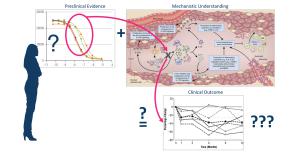Rosa & Co’s 11th Consecutive Appearance at ACoP Showcases the Power of QSP Modeling with PhysioPD™ Research
Panel discussion and posters showcase how PhysioPD™ Research fundamentally improves decision making at critical steps in drug development
SAN CARLOS, CA, USA, November 7, 2020 /EINPresswire.com/ -- Rosa & Co1. announced today that it will lead a panel discussion and present six poster presentations at the Eleventh American Conference on Pharmacometrics (ACoP112), to be hosted virtually from 9 -13 November 2020.Rosa & Co.’s presence at ACoP11 aligns with the theme of the conference - “Scaling New Heights” - encompassing scientific expertise and innovation, education, tools and resources, and the expanding role of pharmacometrics in protecting and improving human health.
“We are excited to chair a panel discussion and present at a premier event such as ACoP11, which will be held safely in a virtual format,” said Christina Friedrich, Rosa & Co.’s Chief Engineer. “Our results illustrate how PhysioPD3 Research supports drug development and provides significant insights even when data are sparse, when clinical symptom scores are complex or qualitative, and when a clinical trial is not possible, as is the case for opioid overdose reversal.”
Rosa & Co’s presentations focus on PhysioPD Research contributions in a range of therapeutic areas, including atopic dermatitis and psoriasis, Alzheimer’s disease, treatment-induced vasomotor symptoms, central nervous system diseases, and opioid overdose. In all projects, PhysioPD increased confidence in clinical trial design and/or product submissions based on a material improvement in understanding how drug mechanisms influence clinical outcomes.
The schedules for the panel discussion and the posters to be presented at ACoP11 are as follows:
Monday, November 9, 10:00 – 11:30 AM
Session 1B: Bridging from Mechanistic QSP Models to Subjective or Complex Clinical Outcomes: Challenges and Approaches. Chaired by Michael C. Weis (Affiliation: Rosa & Co. LLC, San Carlos, CA, USA)
Using Mechanistic Quantitative Systems Pharmacology (QSP) Models to Connect Biomarkers to Clinical Disease Activity Scores – Examples in Dermatology and Chronic Inflammatory Diseases Areas. Presented by Vincent Hurez (Affiliation: Rosa & Co. LLC, San Carlos, CA, USA)
Tuesday, November 10, 12:30 – 1:30 PM
TUE-015: Using Mechanistic Quantitative Systems Pharmacology (QSP) Models to Connect Biomarkers to Clinical Disease Activity Scores – Examples In Atopic Dermatitis (AD) And Psoriasis (PsO). Authors: Christina Friedrich, Rebecca Baillie, Michael Weis, Meghan Pryor, Vincent Hurez, Katherine Kudrycki, Michael Reed. (Affiliation: Rosa & Co. LLC, San Carlos, CA, USA)
TUE-057: Development of a Mechanistic Model of Keratinocyte Dynamics and Skin Barrier Function for Psoriasis Research. Authors: Michael Weis, Douglas Chung, Vincent Hurez, Rebecca Baillie, Katherine Kudrycki, Michael Reed. (Affiliation: Rosa & Co. LLC, San Carlos, CA, USA)
Wednesday, November 11, 12:30 – 1:30 PM
WED-083: A Quantitative Systems Pharmacology Model of Alzheimer’s Disease Pathology and Treatment Modalities. Authors: Vidya Ramakrishnan (1), Christina Friedrich (2), Colleen Witt (2), Meghan Pryor (2), Michael Dolton (1), Jasi Atwal (1), Kristin Wildsmith (1), Katherine Kudrycki (2), Robert Sheehan (2), Seung-Hye Lee (1), Hans Peter Grimm (3), Roxana Aldea (3), Norman Mazer (3), Carsten Hofmann (3), Ronald Gieschke (3), Reina Fuji (1), Jin Yan Jin (1), Saroja Ramanujan (1), Angelica Quartino (1). (Affiliations: (1) Genentech Inc., South San Francisco, CA, USA; (2) Rosa & Co. LLC., San Carlos, CA, USA; (3) Hoffmann-La Roche Ltd., Basel, Switzerland)
WED-057: QSP Modeling Shows Efficacy of an NK3R Antagonist to Reduce Treatment-Induced Vasomotor Symptoms. Authors: Chris Schelling (1), Rick Ridgewell (1), Christina Friedrich (2), Katherine Kudrycki (2), Rebecca Baillie (2), Douglas Chung (2), Mike Reed (2). Affiliations: (1) Acer Therapeutics Newton, MA, USA; (2) Rosa & Co. LLC, San Carlos, CA USA
Thursday, November 12, 12:30 – 1:30 PM
THU-014: How does Mechanistic Quantitative Systems Pharmacology (QSP) Modeling Reduce R&D Risk in Data-poor Disease Areas such as Central Nervous System (CNS) Diseases Despite Biological Uncertainty? Authors: Christina Friedrich, Colleen Witt, Meghan Pryor, Katherine Kudrycki, Rebecca Baillie, Robert Sheehan, Mike Reed. (Affiliation: Rosa & Co., LLC, San Carlos, CA)
THU-057: QSP Modeling Predicts Higher Naloxone Doses Will Safely Reverse More Opioid Overdoses and Save Lives. Authors: Ronald B. Moss (1), Dennis J. Carlo (1), Christina Friedrich (2), Katherine Kudrycki (2), Rebecca Baillie (2), Meghan Pryor (2), Mike Reed (2). (Affiliations: (1) Adamis Pharmaceuticals Co., San Diego, CA, USA; (2) Rosa & Co. LLC, San Carlos CA, USA)
Conclusions from the panel discussion and case studies include: 1) the importance of PhysioPD Research for integrating mechanistic and clinical data to investigate new targets, compounds, or protocols; 2) the power of models to reproduce clinical data mechanistically and thereby increase confidence in informed extrapolation to new scenarios; and 3) the need for modeling transparency and stakeholder involvement for QSP outcomes.
About Rosa & Co.
Rosa & Co. was established in 2002 and is known worldwide for its PhysioPD™ Research Platforms, which elucidate the connection between disease mechanisms, therapeutic interventions, and clinical outcomes. PhysioPD Research delivers credible scientific insights and actionable program impact that would be difficult or impossible to achieve with any other research approach.
Patrick van der Valk
Rosa & Co. LLC
+1 415-692-5258
email us here
1 https://rosaandco.com
2 https://www.go-acop.org/
3 https://www.rosaandco.com/physiopd

